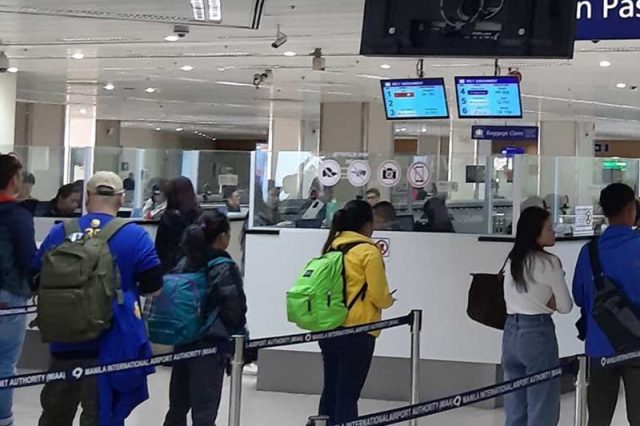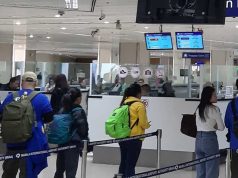Visa-like requirements?
This was the comment of some online users after the government released stricter guidelines for international-bound Filipino travelers in a bid to combat “the grave menace of human trafficking.”
The guidelines, set to take effect on September 3, are released by the Inter-Agency Council Against Trafficking (IACAT) to clarify documents that departing passengers need to bring to satisfy immigration officers on the lookout for trafficking victims.
This comes months after missed flight complaints from passengers due to lengthy interviews by immigration officers, some of whom asked for a graduation or a yearbook photo.
ALSO READ: Anti-trafficking council approves revised departure rules for Filipino travelers
According to the IACAT, the endeavor was “initiated during the concluding quarter of 2022.”
They also said a public-private consultation transpired on May 29, which they said afforded the “general public an avenue to contribute commentary on the draft.”
The revised guidelines require immigration officers to propound relevant clarificatory questions and may require overseas-bound passengers to show additional documents.
IACAT said that Filipinos who travel as tourists overseas need to show the following:
- Passport (valid at least six months from date of departure from country)
- Boarding pass
- Confirmed return or round-trip ticket
- Visa (if required by the destination country)
For self-funded tourists, they may need to show additional documents like:
- Proof of financial capacity or source of income consistent with passenger’s declared purpose of travel
- Proof of employment and other equivalent documents
- Proof of hotel booking or accommodation
Tourists whose overseas travel is sponsored by their relative within the first civil degree may need to show the following:
- Confirmed return or round-trip ticket
- Original birth certificate or report of birth or marriage certificate, or report of marriage as proof of first civil degree relationship
- Copies of the following: documents of sponsor such as valid passport; valid work visa or permit, residence permit, or any equivalent document; overseas employment certificate, e-receipt, or OFW Clearance, for OFW sponsors
The IACAT said that a travel is sponsored “if any part of it is funded by a person other than the passenger (e.g. airfare, hotel booking or accommodation, daily expenses, among others).”
If the sponsor falls within the fourth civil degree of consanguinity or affinity, a notarized original affidavit of support and guarantee and original birth or marriage certificate or report of marriage showing the relationship between the passenger and the sponsor must be presented.
In cases where the travel is sponsored by a non-relative or a legal or juridical entity, an outbound traveler should provide a notarized original affidavit of support and guarantee and a document establishing the relationship between the passenger and the sponsor.
A copy of portions of the guidelines circulated on social media on Wednesday, August 23, irking some Filipinos who commented that it appeared as if they were being required to show requirements for a visa application instead of traveling overseas.
Magbabakasyon ka lang abroad, para kang magsa-submit ng employment requirement papers. pic.twitter.com/w2ZGlRlVJo
— DAVAOMIGRANT (@nabunturanguy) August 23, 2023
“But these are the requirements you need to accomplish when applying for a Japanese visa,” an online user on the X (formerly Twitter) platform wrote.
“I knew the Philippine passport was weak internationally, but it surprises me to hear that it is also weak in the Philippines. You can no longer leave the country with it alone. You may have to provide a huge portfolio of data, including financial statements, to travel overseas,” another user commented, referencing requirements usually needed to secure visas.
“Can’t understand why we have to show financial capacity to [immigration] when we have already submitted those to get a visa. Parang, excuse me, ‘di [ba] sobra na sa data privacy ‘yan?” wrote a different Filipino.
“BI (Bureau of Immigration), naiintindihan ko naman na gusto [niyo] protektahan Pinoy sa human trafficking at higpitan ang gustong mag-TNT, pero sobra naman ‘to!” another Pinoy commented. “TNT” means “Tago Nang Tago,” which refers to undocumented OFWs.
“Akala [niyo] ba napakadaling maglakad ng mga papeles? At ang gastos sa pagkuha ng mga ganto? Jusko. Kulang na lang sabihin [niyo] na ‘wag na magbakasyon,” the user added.
“Imbes na ma-excite mag-travel mga Pinoy, tatamarin na lang sa dami ng additional requirements. Kulang na lang mag-require na ng visa for Filipinos,” another Pinoy commented, referring to the national government.
“Totoo ba ‘to? Sana pala magkaroon na rin tayo ng exit visa or vacation visa as Filipinos in our own country,” a different online user commented wryly.
“Dafuq!!! For real? Those documents/proofs can already get you a Korean or Japan visa, wdym (what do you mean)? What if it’s SEA (Southeast Asia) only? Does one have to present this? Jusko, kaya ka nga magbabakasyon sa no Visa needed countries eh, tapos hihingan ka din ng docs na ganito,” another Pinoy wrote.
“These travel requirements are just too much. They are over-restrictive and violate our constitutional right to travel (Art. III, Sec. 6), among other basic rights,” a different online user said, citing the 1987 Philippine Constitution.
Under the Constitution’s Bill of Rights, Filipinos’ right to travel shall not be impaired “except in the interest of national security, public safety, or public health, as may be provided by law.”
“The liberty of abode and of changing the same within the limits prescribed by law shall not be impaired except upon lawful order of the court,” Article III Section 6 reads.
Rep. Marissa Magsino of the OFW party-list also said that the revised guidelines of IACAT were “too strict” and would “entail a lot of inconveniences.”
“Masyado pong strict to support ‘yong ating anti-human trafficking, we have to preserve the ease of traveling sa ating passengers with respect to their constitutional right to travel,” she said on Wednesday.
“Will they not cause further delay sa pagpo-process ng ating traveler?” the lawmaker added.
‘Dedication’ to protecting Pinoys
Department of Justice spokesperson Mico Clavano said that IACAT’s revised guidelines “is not a curtailment of the right to travel.”
The DOJ is the lead agency of the IACAT.
According to Clavano, it is an “enforcement of a policy” that they believe “fits our culture.”
“Dito pa lang pinoprotektahan na natin ang mga kababayan natin,” he said to reporters.
IACAT said that the revised guidelines aim to “conscientiously” address supposed emergent trends in human trafficking.
It added that “the evolving profile of human trafficking victims is increasingly characterized by individuals assuming the guise of tourists, ostensibly possessing the means to embark on international travel.”
“In truth, however, these individuals harbor aspirations of overseas employment,” the IACAT added.
“Our adherence to these Guidelines signifies more than a mere administrative protocol; it embodies our resolute dedication to protecting the rights and well-being of our fellow Filipinos,” the council said.
It added that such measures “illuminate” their “unwavering stance against exploitation.”
Last April, the Bureau of Immigration said it had recorded some 6,000 suspected victims of human trafficking, illegal recruitment, and misrepresentation for the first two months of 2023.
A month before that, a report said the government had rescued around 2,000 trafficking victims in January and February.
The figure, according to Justice Secretary Boying Remulla, almost equaled the number of victims for the whole of 2022.









